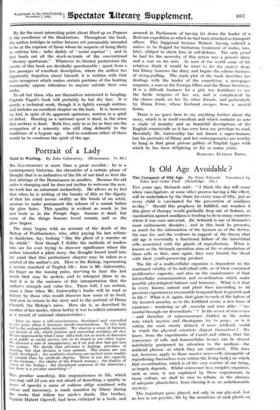Portrait of a Lady
Maid in Waiting. By John Galsworthy. (Heinemann. 75. 6d.) Ma. GALSWORTRY is more than a great novelist : he is a contemporary historian, the chronicler of a certain phase of thought that is as indicative of the life of our land as were the first stirrings of the Renaissance in another. Because the old order is changing and he does not incline to welcome the new, his work has an autumnal melancholy. He allows us to feel that when he is writing of the beauty of this or the dignity of that his mind moves swiftly as the brush of an artist, anxious to make permanent the colours of a sunset before the glow fades. This quality is evident as much in his new book as in the Porsyte Saga. Soames is dead, but some of the things Soames loved remain, and so the glow lingers.
The story begins with an account of the death of the Bishop of Porthminster, who, after paying his last tribute to dandyism, lay, looking " like the ghost of a warrior on his shield." Now though I dislike the methods of readers who are for ever trying to discover significance where the author intended a plain story, the thought forced itself into my mind that this preliminary chapter may be taken as a symbol of the author's art. Here is the Bishop, representing a certain standard of English life : here is Mr. Galsworthy, his finger on the waning pulse, straining to hear the last words that may be spoken, and to interpret them to us. And it is in the sureness of this interpretation that the author's strength and value lies. There will, I am certain, come a time when Mr. Galsworthy's books will be read as history by those who would discover how some of us lived. And now to return to the story and to the portrait of Dinny Cherrell, the Bishop's niece. Here she is, as described by another of her uncles, whose hobby it was to collect miniatures as a record of national characteristics : " Here we have a self-consciousness, developed and controlled to the point when-it becomes unself-consciousness. To this lady Self is the unforgiveable intruder. We observe a sense of humour, not devoid of wit, which informs and somewhat sterilizes all else. We are impressed by what I may call a look not so much of domestic as of public or social service, not to be found in our other types. We discover a sort of transparency, as if air and dew had got into the system. We decide that precision is lacking, precision of learning, but that decision is very present. The senses are not highly developed ; the aesthetic emotions are excited more readily by natural than by artificial objects. There is not the capacity of the German ; the clarity of the French woman ; the duality of colour of the Italian ; the disciplined neatness of the American ; but there is a peculiar something—" This peculiar something, this responsiveness to life, which you may call (if you are not afraid of describing a quality in terms of speech) a sense of noblesse oblige combined with valour and innocency, is made manifest by Dinny during the weeks that follow her uncle's death. Her brother, Captain Hubert Cherrell, had been criticized in a book, and accused in Parliament of having let down the leader of a Bolivian expedition to which he had been attached as transport officer. This happened because Hubert, having ordered a native to be flogged for barbarous treatment of mules, was, later, obliged to shoot him in self-defence. The only proof he had for the necessity of this action was a private diary and a scar on his arm. As men of the world some of his relatives think it would be wiser to let the matter drop, but Dinny borrows the diary and begins the odious business of string-pulling. The main plot of the book describes her dealings with the leader of the expedition, . a. newspaper magnate, a man at the Foreign Office and the Home Secretary. It is a difficult business for a girl, too- fastidious to use the facile weapons of her sex, and is cOmplicated by the claims made on her by other friends, and particularly by Diana Ferse, whose husband escapes from a mental home.
. There is no space here to say anything further about the story, which is in itself excellent and which contains as sane a study of, insanity and as beautiful descriptions of the English countryside as it has ever been my privilege to read. Mercifully Mr. Galsworthy has not drawn a super-woman, but his portraits of Dinny and her contemporaries are worthy to hang in that great picture gallery of English types with which he has been delighting us for so many years.
BARBARA EI:PlIAN TODD.














































 Previous page
Previous page